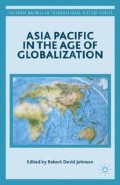Abstract
The diverse but United States of America were born out of a shared motivation to forge a new society and create a new national identity. The founding of this new country was underpinned by the freedoms earned in an arduous, but successful revolution. As this creation of a new identity evolved into a great historical experiment in republicanism, the North American continent became the historical canvas upon which a new national self-portrait was rendered. Grounded in the basic tenets of individual freedom and liberty, Dwight David Eisenhower’s historical role and legacy on that continent came to epitomize American identity at the middle of the 20th century. This was true not only for his fellow countrymen, but also for much of the world, as “Ike” became America’s premier internationalist.
Access this chapter
Tax calculation will be finalised at checkout
Purchases are for personal use only
Preview
Unable to display preview. Download preview PDF.
Suggested readings
Bowie, Robert R., and Immerman, Richard H., Waging Peace: How Eisenhower Shaped an Enduring Cold War Strategy. New York: Oxford University Press, 1998.
D’Este, Carlo, Eisenhower: A Soldier’s Life. New York: Henry Holt and Company, 2002.
Jones, Brian Madison, Abolishing the Taboo: Dwight D. Eisenhower and American Nuclear Doctrine 1945–1961. Solihull, UK: Helion & Company, 2011.
Nichols, David A., Eisenhower 1956: The President’s Year of Crisis; Suez and the Brink of War. New York: Simon & Schuster, 2011.
Osgood, Kenneth, Total Cold War: Eisenhower’s Secret Propaganda Battle at Home and Abroad. Lawrence, KS: University Press of Kansas, 2006.
Terzian, Philip, Architects of Power: Roosevelt, Eisenhower, and the American Century. New York: Encounter Books, 2010.
Tucker, Nancy Bernkopf, The China Threat: Memories, Myths, and Realities in the 1950s. New York: Columbia University Press, 2012.
Tudda, Chris, The Truth Is Our Weapon: The Rhetorical Diplomacy of Dwight D. Eisenhower and John Foster Dulles. Baton Rouge, LA: Louisiana State University Press, 2006.
Editor information
Editors and Affiliations
Copyright information
© 2015 Carl W. Reddel
About this chapter
Cite this chapter
Reddel, C.W. (2015). Ike: The American Internationalist. In: Johnson, R.D. (eds) Asia Pacific in the Age of Globalization. The Palgrave Macmillan Transnational History Series. Palgrave Macmillan, London. https://doi.org/10.1057/9781137455383_6
Download citation
DOI: https://doi.org/10.1057/9781137455383_6
Publisher Name: Palgrave Macmillan, London
Print ISBN: 978-1-349-49815-4
Online ISBN: 978-1-137-45538-3
eBook Packages: Palgrave History CollectionHistory (R0)

